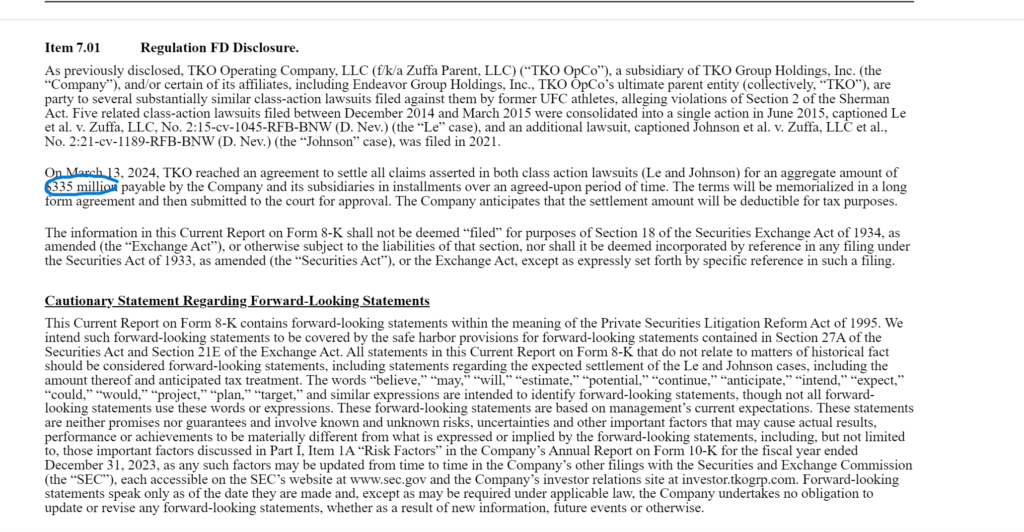In the coming days we will learn of the settlement brokered by lawyers for TKO via Zuffa and plaintiffs in the Le and Johnson antitrust lawsuit. I have some initial takeaways.

- While going to trial seems exciting, lawyers are aware of the potential dangers of going to trial. In my opinion, lawyers attempt to position a case going to trial in a way where a settlement can be reached short of a jury deciding their fate. Why? The fear of the unknown is great. Even if evidence would favor one party or another, the jury could come back with a verdict entirely different. It is very remote, that a judge would take the verdict out of a jury’s hand (yes, a judge can do it), so both sides would have to deal with the prospect of appeal.
- Money. For both sides it would be a costly trial. TKO would have to budget for the immense amount of costs and expenses for a trial (and appeal) on top of the millions of dollars it has spent on this case in the 10 years it has been around. Same for the plaintiffs’ attorneys who would have to consider its own business in light of a potential verdict in front of TKO. Most likely attorneys for Cung Le, et al. would not go broke like in the movie remake of A Civil Action, but the actual legal costs (e.g., paying for experts, travel, etc.) were mounting. If presented with a viable settlement that their clients could live with, they would take it.
- Wage share v. Wage level. Oh yes, the “battle of the experts.” One of the more interesting things that we will miss out on is how well would a jury have digested the information both parties’ experts would have given?
- UFC 300. Although less of a factor, UFC 300 would have happened a couple days before the start of trial. One would think that Zuffa did not want to have the start of this trial overshadow one of its benchmark moments of reaching 300 PPV events.
- Was the UFC anticompetitive? The major issue at trial would have been whether Zuffa’s business practices were procompetitive or anticompetitive. Zuffa would argue that its use of contracts and edging out competition were a part of building their business and beating out competitors that were not as successful. The plaintiffs would argue specifically that the UFC’s contracts were restrictive and prevented fighters from being able to earn. Due to its depth of roster, it choked off other competitors since promotions lacked stars and (arguably) the best MMA talent because they were in the UFC. The emails, texts and other evidence including the possible testimony of former matchmaker Joe Silva and Dana White would have been key. It is one of the reasons why Zuffa likely wanted to settle was to avoid having Silva or White testify on the stand.
- Has anything changed? Assuming that the Court approves the settlement and it does not include any substantive changes to the structure of UFC contracts, the question will be whether anything has changed for fighters in the UFC. And the answer has to be no. Fighter mobility and fighter pay remain a huge issue that would have been addressed at this trial. Yet, 10 years later, fighters find themselves in the same situation as they were when this lawsuit was filed. Money as gotten better over time. There are more organizations. But the contractual restrictions remain. Moreover, as pointed out by Zuffa in one of its filings, other organizations have adopted the contracts. Thus, more fighters are locked in, not just to the UFC, but to other fight organizations. Fighter pay, which has been the center of much of the controversy remains an issue. In fact, one might argue with more state commissions no longer disclosure fighter pay, the public view of the lack of pay becomes less known.
- UFC avoids the comparison to other leagues. In lead-up to trial, the UFC was being compared to major sports leagues with collective bargaining power. So, while players in the NBA, NFL and NHL share revenue with the owners closer to a 52-48 share in favor of the owners, a UFC fighter’s average pay is less than 80% of the generated revenue. Not a good look for the UFC if you knew nothing about the company or its business practices. With the settlement, the comparisons will likely disappear from the mainstream.


Leave a Reply